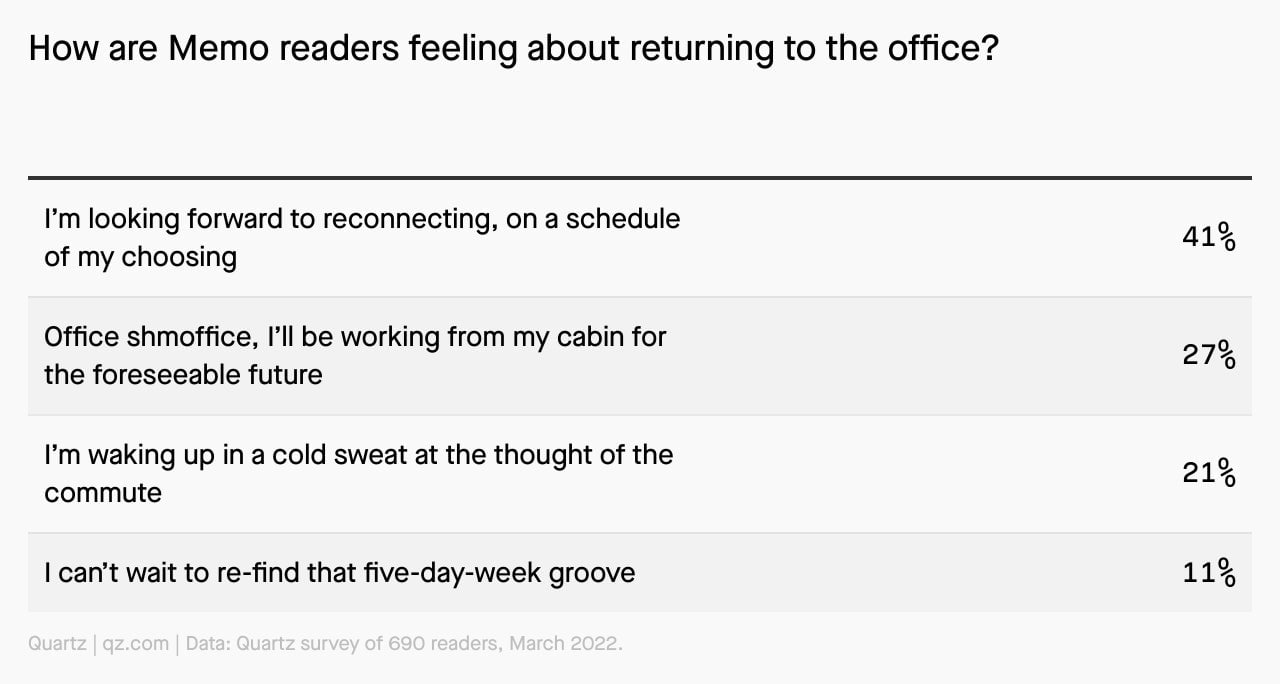Will your salary keep up with inflation?
Inflation has come for the sad desk lunch. The average price of a humble wrap is up 18% in major US cities compared with a year ago, according to The Wall Street Journal, while the cost of a sandwich is up 14%.


Inflation has come for the sad desk lunch. The average price of a humble wrap is up 18% in major US cities compared with a year ago, according to The Wall Street Journal, while the cost of a sandwich is up 14%.
That’s just one sign that companies should be steeling themselves for a barrage of raise requests from workers looking to keep up with the rising cost of living. In the US, inflation is up 7.9% from a year ago, according to the most recent data from the Bureau of Labor Statistics. In the UK, inflation rose 6.2% on an annual basis—the biggest jump in three decades.
“We were in this long period where general pay raises often came in on the order of 2-3% to reflect cost-of-living increases in a low-inflation environment,” says Jake Rosenfeld, a professor of sociology at Washington University in St Louis and the author of You’re Paid What You’re Worth: And Other Myths of the Modern Economy. Now, he says, “there are plenty of employers who aren’t matching the recent inflation increase with a similarly sized compensation adjustment.”
In a tight labor market, employers that can’t, or won’t, offer pay bumps commensurate with inflation may be at higher risk of losing workers already predisposed to look for new jobs. “In general, when the labor market is hot, people have their ears to the ground,” says Paul Oyer, a professor of economics at Stanford’s Graduate School of Business.
For companies that decide to give raises on par with inflation, Oyer says that doing so won’t necessarily put a stop to resignations. After all, the best way to get a pay bump is to change jobs.
But it may make a difference to people who are uncertain about whether to stay or go. For someone who was thinking, ‘I’ll just send out a resume and see how it goes,” Oyer says, “now they’re going to be like, ‘Okay, well I just got a 6% raise, then I might as well stick around for a while.’”
Even if companies can’t offer raises that compensate workers for inflation, they should acknowledge the impact of rising costs on workers’ paychecks, according to Anthony Klotz, an associate professor of management at Mays Business School at Texas A&M University who coined the term “Great Resignation.”
“We know from years of research on fairness at work that employees can take bad news, like even a furlough or a pay cut,” Klotz says. But employers need to be transparent about why inflation-adjusted raises aren’t happening right now, and how they plan to make it up to employees. “You may say, ‘A year from now, if these things happen, you will be in a position where I could give you all a bonus or give you all raises.’ Really engage employees in that conversation.”—Sarah Todd
Read the full story here.
Five things we learned this week
👋 Accessible design has lessons for all of us. Here are some tips and tricks that help make work smoother right now.
🏳️🌈 Amazon’s attempt to add its name to Seattle Pride backfired. The parade’s organizers parted ways with the tech giant following its $100,000 offer.
🍃 This is the case for starting your company as a B Corp. Speakers at a Quartz panel extolled the virtues of charting a sustainable path from day one.
🖊️ Letting work evolve won’t make it fair. We need to learn from the upheaval of the pandemic, and plan for big changes coming down the road.
💪 Today’s labor shortage is the result of a failure to value workers. Companies are reaping what they sowed during the pandemic.
To return, or not to return
A recent edition of The Memo asked how you were feeling about returning to the office—or not. The results are in. And for the vast majority of you, flexibility is king.

30-second case study
Vlad Mystetskyi, a Ukrainian tech worker living in Tel Aviv, watched in horror as Russia invaded his home country on Feb. 24. Soon, refugees began arriving in neighboring countries, and like many observing from afar, Mystetskyi wanted to help. He managed to do so in the most practical of ways: With a small group of co-workers from his company, monday.com, a project management app, he decamped to Poland where makeshift refugee camps were being set up.
It was chaos. Ukrainians, mainly women and children, were arriving and needing to plan their next move. From the rest of Europe, volunteers and drivers were turning up, offering help. But there was no way to coordinate who needed what. The monday.com team sprang into action, working with a vetting startup to make sure those offering lifts or accommodation to refugees had been checked and could be tracked, and matching up people in need with those able to offer it.
“First, we solved the chaos problem,” says Mystetskyi, “then we made everything as coordinated as possible to give people the best experience that they can get in such circumstances.”
The takeaway: Mystetskyi’s team had a solution in place in just 24 hours, testament to the possibilities that can result from addressing a very specific problem, and the power of iteration.
Mystetskyi also credits the team’s success to a company-wide effort. Several employees in monday.com offices around the globe jumped on Slack to answer questions and troubleshoot at all hours. “I’m so proud of what monday.com did,” he told Quartz. But he was also impressed by the willingness of other tech companies to share information and software that was easily integrated into the monday.com system.
His message to other private sector companies that might want to assist Ukraine’s refugees or others caught in future wars and catastrophes is this: Just go and see what needs to be done. You won’t be able to figure out what role you can play until you get there.
You got the Memo!
This week’s edition of the Memo was written by Sarah Todd, Lila MacLellan and Cassie Werber. It was edited by Francesca Donner. Write to us at [email protected]. Get the most out of Quartz by downloading our app and becoming a member.